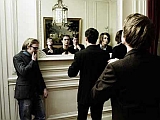Whatever perception you might have had of Austria, there is a province in the far East of the country called Burgenland that is guaranteed be its polar opposite: It is almost completely flat, mostly rural, but deeply multicultural with very strong Croatian, Hungarian and Roma influences. In the middle of one of its endless fields there is a huge old mill called the Cselley Mühle. Bands used to play there since the 1970s, but when they didn’t, it was the quietest place on Earth. Still is, in fact.
It’s not often that you can trace the sound of a band to one building in the middle of a field, but this is where Garish started out in the late nineties, recording their first musical steps under the guidance of Thomas “Kantine” Pronai, who has remained their producer to this day.
This is what all great bands are like: open to all influences and yet stubbornly idiosyncratic. And in the case of Garish, “great” is a word not lightly spoken. Like all German-singing bands, in spite of all the awards and charts placings they have garnered along the way, their public recognition has so far been hemmed in by a seemingly insurmountable language barrier.
But there is something about their latest album “Wenn dir das meine Liebe nicht beweist”, which might just break this cast-iron law of an Anglo-centric international pop culture. It is something that needs no explanation, because you can hear it as soon as you put the record on, in the first few notes of “Dann fass ich mir ein Herz”.
Singer Thomas Jarmer happens to be a brilliant poet, you’ll just have to take our word for it. But luckily, you don’t really need to understand his lyrics to hear what he and the rest of the band are on about. Going down to the river, making everything clear, having a ticket in your pocket for that journey across the sea.
On the face of it, Garish, i.e. Thomas, his brother Christoph, Julian Schneeberger, Markus Perner and Kurt Grath are a regular band in the extended, post-Arcade Fire sense which includes accordions, clarinets, mandolins, double-bass, trumpets, huge vocal harmonies and a string ensemble. But underneath the gorgeous polyphonic richness and the all-pervasive mood of longing melancholy, in the circular structure of their ridiculously infectious songs and their subtly dynamic rhythmical arrangements you can detect traces of central European folk dances as well as modern dance music (see the loop-like build-up of “Die Perspektive” or the hearty stomp of “Eisenherz”).
The other thing that you will hear, especially amidst the dissonance of instrumental “Zampano”, the quiet reflection of the title track and ballads like “Die Wahrheit ist, davon krieg ich den Mund nicht voll” or “Unglück trägt denselben Namen”, is the sound of the building where they were recorded, that huge mill in the middle of a field in a province to the East, way out where even the visiting Viennese wouldn’t understand the locals as they ask them for directions. “Heute hör ich von dir, hier werd ich nicht alt”, Thomas Jarmer sings in “Komme nie zu spät”, which translates as: “Today I heard you say, I’m not going to grow old in this place.”
You bet they won’t. But wherever they end up, they will carry that place with them in their magical music.
Robert Rotifer

